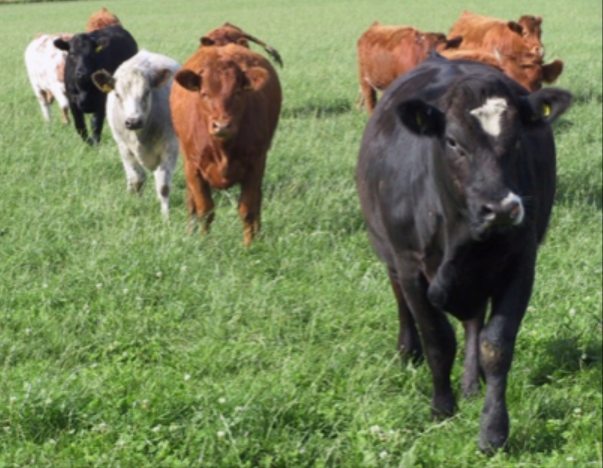



Warm Weather Increases Parasite Risk in Sheep, Cattle
NADIS and Merial Animal Health are warning sheep and cattle farmers that recent above average temperatures could lead to a rise in parasitic disease in growing animals this summer.Dairy and beef cattle are at risk of husk, caused by infection with the cattle lungworm from June onwards. Unvaccinated calves, naïve adult cattle and those without an effective anthelmintic programme face the greatest threat.

“Early intervention significantly reduces costs and the impact on productivity. A diagnosis should be sought from the farm’s vet at the first sign of symptoms, “ advises Sioned. “Treatment with a fast acting zero milk withhold wormer with up to 28 days of persistent activity, such as Eprinex® (eprinomectin) provides effective control without the loss of milk sales.”
Incidents of parasitic disease caused by gutworms, including Ostertagia ostertagi, peak in August and September, though even low levels of worm challenge can reduce growth rates by up to 30% in beef calves and dairy replacement heifers.
Strategic control with a broad-spectrum wormer such as IVOMEC® Classic (ivermectin) can reduce the impact of parasites in autumn/winter born calves in their first grazing season, and spring-born suckler claves in their second grazing season. Those animals receiving strategic treatments must remain set stocked for the entire grazing period or moved to aftermaths when they become available.
However, it’s not just youngstock that is affected by gutworms.
“In adult dairy cows, gutworm infections can reduce milk yield by 1kg per day, which if the whole herd is affected can have a significant impact on income and profitability.” says Sioned. “Using a weatherfast, quick-acting, zero milk withhold wormer such as Eprinex® (eprinomectin) allows treatment of gutworm at the most appropriate time without the loss of milk sales or the need to house cattle before/after treatment.
Farmers concerned about the parasite status of their livestock should talk to their vet or local animal health advisor.
The timing of worm treatments for lambs during the grazing season will depend upon prevailing weather conditions, grazing history, levels of contamination and stocking density. Prolonged dry weather conditions during the spring may have delayed the larval challenge, but infectivity will increase once wetter weather returns and leave lambs susceptible to parasitic gastroenteritis (PGE).
Lambs on safe grazing at the start of turnout shouldn’t need worming until after they are weaned. Ideally lambs should be weaned onto silage or hay aftermaths that have not been grazed by sheep earlier in the year.
Lambs grazing permanent pastures will usually require worming to limit the build-up of infective larvae later in the season. Regular performance monitoring, or worm faecal egg counts (FEC) of lambs, from June onwards can be used to guide anthelmintic treatments. Treatment is generally recommended when FECs exceed 500-700 epg.
Targeting worm treatments for lambs failing to meet expected growth rates can reduce the risk of selecting for resistant strains of worms. Lambs in good body condition can be left untreated, allowing a pool of unselected parasites to re-infect the pasture, maintaining wormer efficacy in the longer term. Weighing lambs every 3-4 weeks will help identify poor growth rates and those individuals which will benefit from treatment.
Parasite control in rams can sometimes be forgotten, and yet they often graze the same pasture year on year and may be at increased risk of parasite challenge as a result of this.
Sioned Timothy, Veterinary Advisor for Merial Animal Health says: “Rams are fully susceptible to PGE but are often forgotten in the farm’s parasite control strategy. To preserve fertility, rams must be in good condition with a target condition score of 3.5 at tupping in October/November. It can take at least two months of good grazing for rams to gain one unit of condition score and parasites can negatively impact weight gain. Assessing whether rams would benefit from a wormer treatment during the summer will help ensure they are fit to perform at tupping time.”
Ivomec Classic:
Ivomec® Classic injection/pour-on for cattle contains ivermectin. Ivomec® and the steerhead® logo are a registered trademarks of Merial Ltd. ©Merial Ltd 2017. All rights reserved. Legal category: POM-VPS. Advice on the use of these or alternative medicines must be sought from the medicine prescriber. For further information refer to the datasheet, contact Merial Animal Health Ltd CM19 5TG, or call the Merial Customer Support Centre on 0800 592699. Merial is now part of Boehringer Ingelheim.
Use medicines responsibly. www.noah.co.uk/responsible
Eprinex:
EPRINEX® 0.5% w/v Pour-On for Beef and Dairy Cattle contains eprinomectin. EPRINEX® and the steerhead® logo is are registered trademarks of Merial Ltd. ©Merial Ltd 2017. All rights reserved. Legal category: POM-VPS. Advice on the use of these or alternative medicines must be sought from the medicine prescriber. For further information refer to the datasheet, contact Merial Animal Health Ltd CM19 5TG, or call the Merial Customer Support Centre on 0800 592699. Merial is now part of Boehringer Ingelheim.
Use medicines responsibly. www.noah.co.uk/responsible
About Merial
On January 1st, 2017, Merial became part of the Boehringer Ingelheim group. As the second largest animal health business in the world, Boehringer Ingelheim is committed to making the industry even better at improving animal health. With more than 10,000 employees worldwide, Boehringer Ingelheim Animal Health has products available in more than 150 markets and a global presence in 99 countries. For more information about Boehringer Ingelheim Animal Health, visit: www.boehringer-ingelheim.com/animal-health/animal-health.
About Boehringer Ingelheim
Boehringer Ingelheim is one of the world’s 20 leading pharmaceutical companies. Headquartered in Ingelheim, Germany, Boehringer Ingelheim operates presently with a total of some 50,000 employees worldwide. The focus of the family-owned company, founded in 1885, is on researching, developing, manufacturing and marketing new medications of high therapeutic value for human and veterinary medicine. In 2015, Boehringer Ingelheim achieved net sales of about 14.8 billion euros. R&D expenditure corresponds to 20.3 per cent of net sales. For more information, please visit www.boehringer-ingelheim.com.
TheCattleSite News Desk


